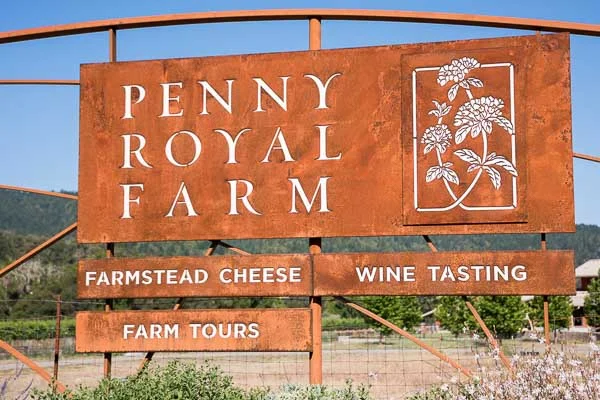Nothing makes cheese taste better than seeing the place where it’s made. Alas, most American creameries don’t welcome visitors. Sanitation is the main issue, and few small producers have the staff for tours. But in California’s scenic Anderson Valley, Pennyroyal Farmstead Cheese is charting a different course. In March, the three-year-old Boonville creamery opened a tasting room and began offering tours. From anywhere, it’s worth the journey.
Pennyroyal proprietor Sarah Cahn Bennett grew up in the valley; her parents started Navarro Vineyards. For years, the family owned an undeveloped 100-acre parcel near the winery. It’s undeveloped no longer. Cahn Bennett has planted Sauvignon Blanc and Pinot Noir grapes, erected barns and a milking parlor, installed a small creamery and now built a tasting room for the farm’s cheeses and wines.
Cahn Bennett’s co-conspirator in all this is Erika McKenzie-Chapter (pictured below), an animal-biology graduate who spent a year making goat cheese in France. The two met at U.C. Davis, and in long “what-if” conversations, they hatched the idea for a farmstead creamery-slash-winery, convinced that the enterprises could be synergistic.
“We always knew cheese would not be the moneymaker,” says McKenzie-Chapter. “Wine is what supports everything.” Even so, the various parts nourish each other. Barn bedding becomes vineyard compost. Visitors come for the animals but leave with wine and cheese. Pasture-raised chickens keep insects in check and contribute eggs to the revenue stream. So far, so good.
“I don’t work a 40-hour week,” McKenzie-Chapter told me. I gathered that. She makes the cheese, manages the livestock (103 goats and 28 sheep), feeds the newborns from a bottle and knows every goat by name. And she keeps the place pristine. The barn smells like fresh hay and not like—well, you know. Even the Gentlemen’s Club, where the bucks reside, is surprisingly tidy for an all-male dormitory.
The petite creamery produces five different cheeses—a mere 120 pounds a day on average. In spring and early summer, the sheep contribute about 15 percent of the milk for each cheese. When the sheep are on sabbatical, roughly August until March, the cheeses are 100 percent goat’s milk. My favorites:
- Laychee: a fresh, fluffy, rindless cheese with aromas of cottage cheese and lemon peel
- Velvet Sister: a Camembert-style disk with a delicate mushroom scent and silky texture
- Boont Corners: a 3-1/2-pound raw-milk wheel with a natural rind, matured anywhere from two months to ten months. I like it at every stage. The two-month-old Tomme is tart and creamy; with age, the interior becomes more brittle and the aromas nutty and sweet, with caramel notes. Vintage (four to six months) wins the popular vote, says the cheesemaker, but a 10-month-old wheel I tasted was fabulous. Anything over six months is designated Reserve.
Pennyroyal Farm offers tours twice daily Thursday to Monday. Check the website for details; reservations are encouraged. The tour concludes with a tasting of the farm’s wines and cheeses.
Look for Pennyroyal Farmstead cheeses at Cheese Plus and Mission Cheese in San Francisco; Cheese Board in Berkeley; Oxbow Cheese Merchant in Napa; Oliver's Market in Santa Rosa, Cotati, Montecito and Windsor; Harvest Market in Fort Bragg and Mendocino; Petaluma Market in Petaluma; and at these farmers’ markets: Marin Civic Center in San Rafael (Thursday); Marin Country Mart in Larkspur (most Saturdays); Center Street in Berkeley (Saturday) and Clement Street in San Francisco (Sunday). Pennyroyal also sells via mail order and its five-shipment Farm to Table Program is a pretty good deal.




